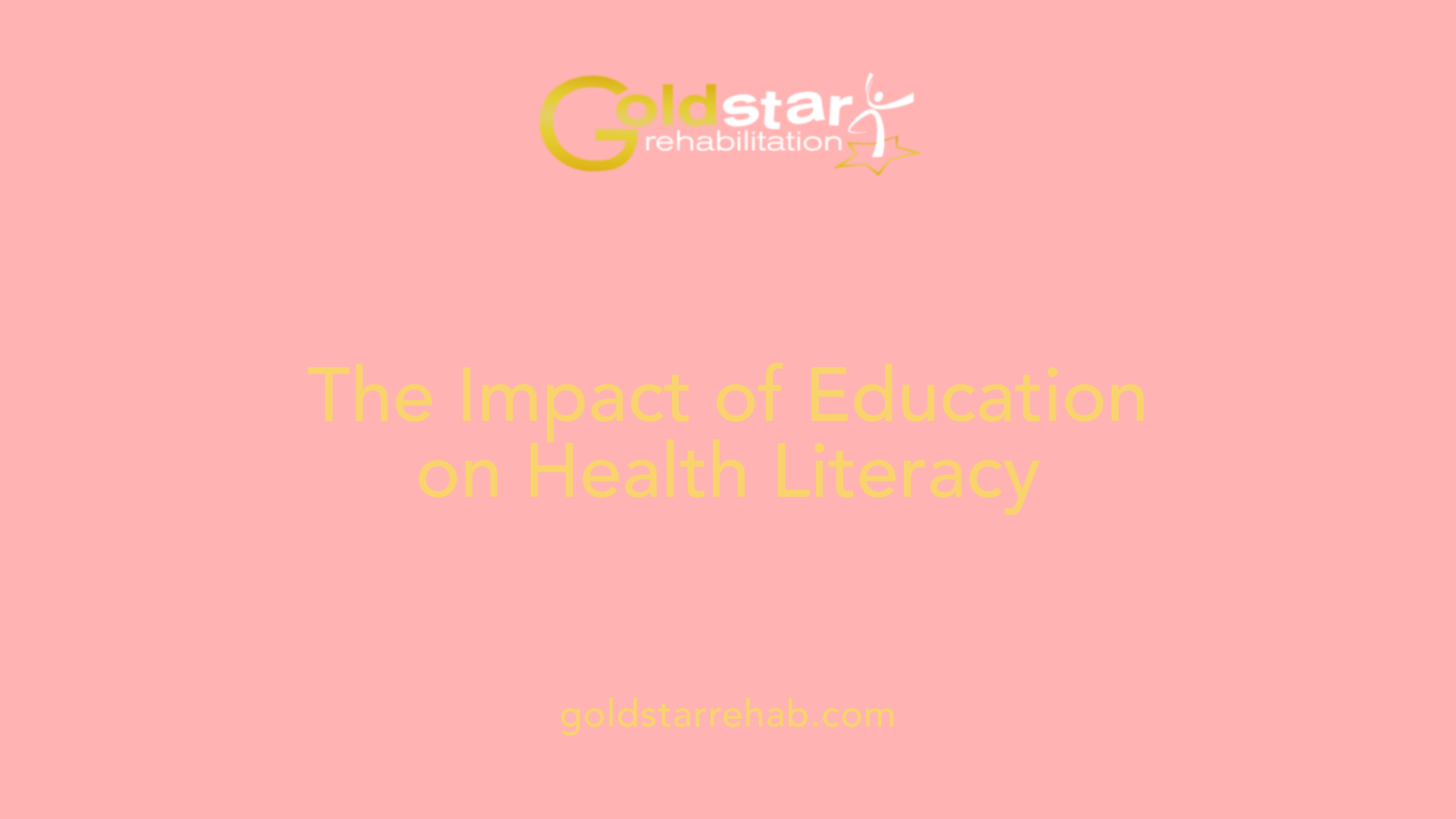The Role of Education in Empowering Rehab Patients
Empowering Rehab Journeys Through Education
Introduction
Education in rehabilitation goes beyond traditional methods of care, serving as a transformative tool that empowers patients to understand their health, enhance their recovery, and impact their long-term wellness. As healthcare evolves into a more collaborative approach, patient education stands at the forefront, offering a path to not only inform but connect patients with their healthcare providers and themselves. This article delves into the multifaceted role of education in rehabilitation, showcasing strategies and success stories that underline its significance.
The Crucial Role of Education in Rehabilitation

What is the role of education in patient rehabilitation?
Education plays a crucial role in patient rehabilitation by empowering individuals to manage their health and understand their chronic diseases, treatment options, and health behaviors. It not only enhances health literacy but also facilitates informed decision-making.
A clear understanding of their medical conditions allows patients to adhere to treatment plans more effectively, significantly reducing hospital readmissions and improving overall health outcomes. Techniques such as the teach-back method help ensure that patients fully grasp the information provided, allowing for the clarification of any misconceptions.
Personalized education is particularly beneficial in settings like Direct Primary Care, where information can be tailored to meet specific patient needs. This individual approach boosts patient confidence and satisfaction while enhancing their engagement in their own care.
Moreover, involving caregivers in the education process reinforces care instructions and supports better recovery outcomes, creating a solid foundation for sustained health improvements.
How does empowerment through health literacy affect treatment outcomes?
Empowerment through health literacy transforms the patient-provider relationship. It encourages patients to actively participate in their care decisions, fostering a collaborative approach that contributes to better treatment outcomes. Educated patients are more likely to engage in preventive health behaviors and comply with medical regimens.
Healthcare providers play a pivotal role in enhancing health literacy by using plain language and effective communication strategies to convey important health information. This increased understanding leads to reduced anxiety and improved patient experiences, which are essential in rehabilitation contexts.
Why is adherence to treatment plans crucial for recovery?
Adherence to treatment plans is vital for successful rehabilitation. Educated patients are more likely to stick to their prescribed regimens, which directly correlates with improved health outcomes. They are also less likely to experience anxiety, leading to a more positive outlook during recovery.
As patients gain knowledge about their conditions and treatment options, they become more empowered, feeling responsible for their health management. This proactive engagement not only enhances compliance but also promotes overall wellness, essential for long-term recovery.
Enhancing Health Literacy and Outcomes

How does patient education impact health literacy and outcomes in rehabilitation settings?
Patient education is a cornerstone in improving health literacy, particularly crucial in rehabilitation contexts where individuals often face significant health challenges. Effective educational resources empower patients to grasp their health conditions and treatment pathways. For instance, methods like the teach-back technique facilitate comprehension by allowing patients to repeat back what they’ve learned, reinforcing understanding and retention.
When patients grasp their treatment plans, they’re more likely to participate actively in their healthcare. This active involvement leads to better adherence to prescribed regimens and self-care strategies, resulting in improved health outcomes.
Moreover, high-quality patient education correlates with a decrease in hospital readmissions. Well-informed patients are better equipped to manage potential complications before they escalate, significantly lowering overall healthcare costs. The synergy between patient empowerment through education and health outcomes creates a cycle of improvement that benefits both individuals and the healthcare system.
Ultimately, providing robust patient education not only prepares patients to handle their conditions but also enhances overall satisfaction with healthcare services, making it a vital strategy in rehabilitation and beyond.
Strategies for Effective Patient Education

What strategies can enhance patient education in rehabilitation?
To improve patient education in rehabilitation, it’s essential to implement personalized education programs that are tailored to meet the diverse learning styles and preferences of individuals. Educating patients using materials that are both accessible and comprehensible fosters better understanding and retention of information.
Healthcare providers, including nurses and physical therapists, should refine their communication skills. Employing techniques such as the teach-back method allows practitioners to confirm understanding by encouraging patients to explain concepts back in their own words. This two-way communication helps ensure that patients have grasped essential information.
A structured approach like the Assessment, Planning, Implementation, and Evaluation (APIE) model can be beneficial. By setting clear, measurable educational goals, healthcare providers can ensure that the information is relevant to each patient’s rehabilitation journey, enhancing their learning experience.
How can technology facilitate patient education?
Utilizing technology in patient education can significantly enhance engagement and accessibility to information. Electronic patient portals allow patients to access their health information, educational resources, and rehabilitation plans anytime, promoting self-management.
Incorporating multimedia tools such as instructional videos and interactive content can cater to different learning preferences, making education more engaging. These digital platforms provide ongoing support and resources, crucial for consistent patient engagement, especially during recovery.
What role does a supportive environment play in patient education?
Creating a supportive environment is critical in enhancing patient education. Involving family members in educational sessions helps foster a network of support that can motivate and encourage patients. Building rapport between healthcare providers and patients promotes trust and commitment, making patients more likely to adhere to rehabilitation plans.
Ultimately, empowering patients through effective education not only boosts their involvement in care decisions but also contributes to better health outcomes, enabling them to take control of their recovery journey.
Psychoeducation in Addiction Recovery

How does psychoeducation play a role in addiction recovery within rehabilitation programs?
Psychoeducation is essential in addiction recovery within rehabilitation settings. It empowers individuals with knowledge about their addiction, which is crucial in understanding the complexities of their mental health. This educational approach addresses both the psychological and biological aspects of addiction, highlighting how substances impact the brain and behavior.
Through psychoeducation, participants learn to identify personal triggers and the nature of their addiction, fostering increased self-awareness. By understanding these elements, they can develop effective coping mechanisms to handle cravings and high-risk situations, ultimately enhancing their relapse prevention strategies.
Moreover, psychoeducational programs encourage group and family involvement, creating a support system that enriches the recovery process. This supportive atmosphere significantly reduces stigma and shame, empowering individuals to engage more openly in their journey toward sobriety. As a result, participants often demonstrate improved adherence to treatment plans, leading to better health outcomes and a more resilient approach to overcoming challenges.
Examples of educational strategies include workshops, peer discussions, and interactive sessions that cater to diverse learning preferences. This multifaceted approach ensures that individuals not only gain knowledge but also apply practical skills necessary for sustained recovery.
The Power of Communication in Patient Empowerment

What is the impact of effective communication from healthcare providers on patient empowerment?
Effective communication from healthcare providers is crucial for fostering patient empowerment. When healthcare professionals communicate clearly and provide accessible health information, patients feel more comfortable asking questions and voicing their concerns. This openness allows patients to make informed decisions about their treatment options.
Programs like Pfizer's 'Find Your MBC Voice' illustrate the significance of patient education, particularly for those dealing with complex health conditions, such as metastatic breast cancer. Through tailored communication strategies, healthcare providers can enhance patients' health literacy, enabling them to better understand their health needs.
Moreover, empowered patients are more likely to adhere to prescribed therapies, which ultimately leads to improved health outcomes. This collaborative relationship fosters mutual respect, allowing patients to engage actively in their care processes.
In summary, effective communication serves as the backbone of patient empowerment, equipping individuals with the knowledge and support they need to take charge of their health.
Conclusion
Education in rehabilitation is not just an addition but a necessity that fosters empowerment, healing, and resilience. By focusing on tailored educational approaches, effective communication, and active participation of patients and their families, healthcare providers can significantly enhance recovery journeys. As patient education continues to evolve, it holds the potential to redefine rehabilitation experiences, placing patient empowerment and informed decision-making at the core of healthcare. This shift not only improves health outcomes but also strengthens the patient-provider relationship, creating a more supportive and effective healthcare environment.
References
- Promoting Patient Education and Health Literacy - PMC
- Addiction Education in Rehab: Empowering Recovery Through ...
- The Role of Education in Empowering Patients About Their Health
- The Importance of Education in Recovery
- Improving health outcomes through patient education and ...
- Empowering Patients through Education - Proventa International
- Empowering Patients through Health Education: A Vital Role for ...
- The Role of Education in Empowering Patients About Their Health
.png)






















.avif)




